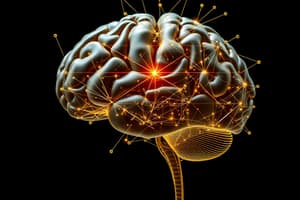Podcast
Questions and Answers
What is psychology?
What is psychology?
The scientific investigation of mental processes and behavior
Where did psychology branch out from?
Where did psychology branch out from?
Physiology and Philosophy
What does structuralism focus on?
What does structuralism focus on?
The structure of consciousness and the mind
Name two structuralists.
Name two structuralists.
What does functionalism focus on?
What does functionalism focus on?
Name two functionalists.
Name two functionalists.
What are the three broad ways of understanding psychological phenomena?
What are the three broad ways of understanding psychological phenomena?
What are the modern perspectives in psychology?
What are the modern perspectives in psychology?
What is the focus of psychodynamic psychology?
What is the focus of psychodynamic psychology?
What does behaviorist psychology study?
What does behaviorist psychology study?
What metaphor is used in behaviorism?
What metaphor is used in behaviorism?
What does cognitive psychology focus on?
What does cognitive psychology focus on?
What metaphor is used in cognitive psychology?
What metaphor is used in cognitive psychology?
What is the main focus of evolutionary psychology?
What is the main focus of evolutionary psychology?
What metaphor is associated with evolutionary psychology?
What metaphor is associated with evolutionary psychology?
What is biopsychology?
What is biopsychology?
What does developmental psychology examine?
What does developmental psychology examine?
What is social psychology concerned with?
What is social psychology concerned with?
What does industrial/organizational psychology study?
What does industrial/organizational psychology study?
What does educational psychology focus on?
What does educational psychology focus on?
What is health psychology concerned with?
What is health psychology concerned with?
What does clinical psychology address?
What does clinical psychology address?
What does cognitive psychology investigate?
What does cognitive psychology investigate?
What does personality psychology study?
What does personality psychology study?
What is a theory in psychology?
What is a theory in psychology?
What is a variable in psychological research?
What is a variable in psychological research?
What is a hypothesis?
What is a hypothesis?
What is a continuous variable?
What is a continuous variable?
What is a categorical variable?
What is a categorical variable?
What is a standardized procedure in research?
What is a standardized procedure in research?
What is a population in research?
What is a population in research?
What is a sample in research?
What is a sample in research?
What is generalizability in research?
What is generalizability in research?
What is internal validity?
What is internal validity?
What is external validity?
What is external validity?
What is a measure in psychology?
What is a measure in psychology?
What is reliability in research?
What is reliability in research?
What is test-retest reliability?
What is test-retest reliability?
What is internal consistency?
What is internal consistency?
What is interrater reliability?
What is interrater reliability?
What is face validity?
What is face validity?
What is construct validity?
What is construct validity?
What is criterion validity?
What is criterion validity?
What is an error in research?
What is an error in research?
What are some types of descriptive research?
What are some types of descriptive research?
What is a case study?
What is a case study?
What are some drawbacks to case studies?
What are some drawbacks to case studies?
What is naturalistic observation?
What is naturalistic observation?
What are some drawbacks to naturalistic observation?
What are some drawbacks to naturalistic observation?
What is survey research?
What is survey research?
What is a random sample?
What is a random sample?
What is a stratified random sample?
What is a stratified random sample?
What are the drawbacks of survey research?
What are the drawbacks of survey research?
What is the Hawthorne effect?
What is the Hawthorne effect?
What is the mean?
What is the mean?
What is the median?
What is the median?
What is the mode?
What is the mode?
What is the range?
What is the range?
What is standard deviation?
What is standard deviation?
What is correlation?
What is correlation?
What is a positive correlation?
What is a positive correlation?
What is a negative correlation?
What is a negative correlation?
What is the nervous system?
What is the nervous system?
What is a neuron?
What is a neuron?
What do sensory (afferent) neurons do?
What do sensory (afferent) neurons do?
What do motor (efferent) neurons do?
What do motor (efferent) neurons do?
What do interneurons do?
What do interneurons do?
What are dendrites?
What are dendrites?
What is the cell body in a neuron?
What is the cell body in a neuron?
What does the axon do?
What does the axon do?
What is the myelin sheath?
What is the myelin sheath?
What is resting potential?
What is resting potential?
What is depolarization?
What is depolarization?
What is hyperpolarization?
What is hyperpolarization?
What is action potential?
What is action potential?
What is a neurotransmitter?
What is a neurotransmitter?
What is the synaptic cleft?
What is the synaptic cleft?
What are excitatory signals?
What are excitatory signals?
What are inhibitory signals?
What are inhibitory signals?
What is glutamate?
What is glutamate?
What is GABA?
What is GABA?
What is dopamine?
What is dopamine?
What is serotonin?
What is serotonin?
What is acetylcholine?
What is acetylcholine?
What are endorphins?
What are endorphins?
What is the endocrine system?
What is the endocrine system?
What is the pituitary gland?
What is the pituitary gland?
What does the thyroid gland do?
What does the thyroid gland do?
What do adrenal glands release?
What do adrenal glands release?
What do gonads release?
What do gonads release?
What is the central nervous system (CNS)?
What is the central nervous system (CNS)?
What is the peripheral nervous system (PNS)?
What is the peripheral nervous system (PNS)?
What is the somatic nervous system?
What is the somatic nervous system?
What is the autonomic nervous system?
What is the autonomic nervous system?
What is the sympathetic nervous system?
What is the sympathetic nervous system?
What is the parasympathetic nervous system?
What is the parasympathetic nervous system?
What is an electroencephalogram?
What is an electroencephalogram?
What are neuroimaging techniques?
What are neuroimaging techniques?
What is the spinal cord?
What is the spinal cord?
What is the hindbrain?
What is the hindbrain?
Flashcards are hidden until you start studying
Study Notes
Psychology Overview
- Psychology is the scientific study of mental processes and behavior.
- Originated from physiology and philosophy.
Key Psychological Schools of Thought
- Structuralism: Analyzes the structure of consciousness (not widely recognized today); founded by Wundt and Titchener.
- Functionalism: Focuses on mental processes that help individuals adapt to environments (not widely recognized today); associated with Darwin and James.
Modern Psychological Perspectives
- Psychodynamic: Founded by Freud; relies on case studies; challenges in testing due to small sample sizes.
- Behaviorist: Pioneered by Pavlov and Skinner; emphasizes that mental processes are outcomes of environmental events; utilizes experimental methods.
- Cognitive: Embraces how individuals perceive, process, and recall information; likened to a computer.
- Evolutionary: Inspired by Darwin; investigates behaviors that contributed to survival in ancestors.
Key Areas of Psychology
- Biopsychology: Explores physical foundations of behavior.
- Developmental Psychology: Studies changes in thought, emotion, and behavior across the lifespan.
- Social Psychology: Examines how individuals are affected by real or perceived social influences.
- Industrial/Organizational Psychology: Investigates human behaviors in work settings.
- Educational Psychology: Focuses on learning processes within educational contexts.
- Health Psychology: Studies psychological factors in health and illness.
- Clinical Psychology: Addresses emotional distress and psychological disorders.
- Cognitive Psychology: Examines mental processes like thought, memory, and language.
- Personality Psychology: Concerns enduring traits of individuals or personality types.
Research Methodology
- Theory: A structured way of interpreting observations.
- Variable: Characteristics that can change or vary.
- Hypothesis: A predictive statement about the relationship between variables.
- Measurement Types:
- Continuous Variable: Rated on a scale.
- Categorical Variable: Grouped into categories.
Validity and Reliability
- Internal Validity: Validity of the methods used in an experiment.
- External Validity: Generalizability of findings beyond the study.
- Reliability: Consistency in measurement results.
- Test-Retest Reliability: Consistency over time.
- Internal Consistency: Items should measure the same construct.
- Interrater Reliability: Consistency across different assessors.
Research Types
- Descriptive Research: Includes case studies, naturalistic observation, survey research, and correlational studies.
- Case Study: In-depth analysis of a small participant group; limited generalizability.
- Naturalistic Observation: Study of individuals in their natural environments; potential for bias.
- Survey Research: Involves large samples via interviews or questionnaires; focuses on attitudes or behaviors.
Statistical Concepts
- Mean: Average score.
- Median: Middle value in a dataset.
- Mode: Most frequently occurring score.
- Range: Difference between the highest and lowest scores.
- Standard Deviation: Variation of scores around the mean.
Neuroscience Foundations
- Nervous System: Integral network of nerve cells for psychological activity.
- Neuron: Basic unit for communication using chemical and electrical signals.
- Dendrites: Receive signals.
- Cell Body: Processes incoming information.
- Axon: Transmits signals outward.
- Action Potential: All-or-nothing nerve impulse signaling.
Neurotransmitters
- Glutamate: Promotes neuron excitation; critical for learning.
- GABA: Inhibitory; regulates anxiety.
- Dopamine: Involved in pleasure, motivation, and motor control.
- Serotonin: Inhibitory; linked to mood and emotional regulation.
- Acetylcholine: Essential for learning and memory.
- Endorphins: Associated with pain relief and mood enhancement.
Endocrine System
- Pituitary Gland: Master gland controlling other glands.
- Thyroid Gland: Regulates metabolism and growth.
- Adrenal Glands: Produce adrenaline for the body’s stress response.
- Gonads: Responsible for sexual hormones influencing development.
Nervous System Structure
- Central Nervous System (CNS): Comprises the brain and spinal cord.
- Peripheral Nervous System (PNS): Connects the CNS to the body’s neurons.
- Somatic Nervous System: Controls voluntary movements.
- Autonomic Nervous System: Manages involuntary life functions.
- Sympathetic Nervous System: Prepares the body for fight or flight response.
- Parasympathetic Nervous System: Restores the body to a state of calm.
Research Technologies
- Electroencephalogram (EEG): Measures brain's electrical activity.
- Neuroimaging: Techniques like PET and fMRI visualize brain activity during tasks.
Studying That Suits You
Use AI to generate personalized quizzes and flashcards to suit your learning preferences.




